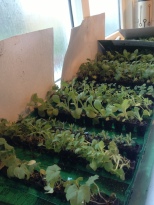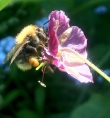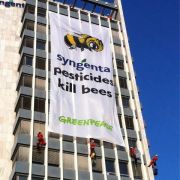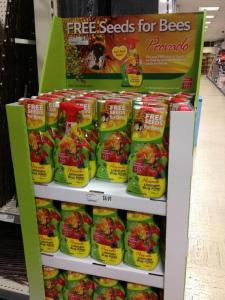No matter what the weather’s doing, potting up plants and sowing seeds marks the start of Spring for me. I love the whole procedure of sorting out the seeds I’m going to sow, and organising and re potting my small plants to larger pots. It’s a simple joy.
But things just got a whole lot more complicated. When buying plants, plugs and seeds we consumers need to ask – have these plants and seeds been pre treated with chemicals? And if so how will that affect the insects in my garden.
Ultimately are my actions killing our pollinators, birds and aquatic invertebrates?
Garden plant suppliers and garden centres have been pre treating plants and seeds they sell with a variety of chemicals which may contain neonicotinoids. Neonicotinoids are a relatively new class of pesticide developed in the 80’s by Shell and furthermore in the 90’s by Bayer. Today they are big business and are manufactured by the giant agribusiness companies Bayer and Syngenta creating a very lucrative global industry.
Neonicotinoids are neuro active insecticides which disrupt and block the receptors of the nervous system resulting in paralysis and death. They are systematic, which means they are absorbed and taken up by every part of the treated plant and seed including pollen and nectar. This is then transferred to any visiting bug or pollinator and BAM! your plant just became a serial killer.
Over 30 separate scientific studies in the last three years have shown adverse affects on insects and linked neonicotinoids with the deep decline in bee numbers and honey bee colony collapse disorder. Earlier this year studies by American Bird Conservancy also indicated toxicity to birds, aquatic invertebrates and other wildlife.
A couple of weeks ago the EU proposed a 2 year ban of three specific neonicotinoids: imidacloprid and clothianidin, made by Bayer, and thiamethoxam, made by Syngenta. The ban would cover their use on crops that attract bees, allowing use on winter crops when bees are dormant. The EU was also considering the ban of neonicotinoids in the garden industry and their sale to domestic gardeners.
However our environment secretary Owen Patterson worked very hard to block the proposal, circulating a note to all 27 countries saying there was insufficient evidence for a ban. Bayer and Syngenta have obviously been lobbying hard to make sure business continues as usual no matter what the damage and with their bases in Germany and the UK it seems their lobbying worked. Germany also blocked the proposal.
And their marketing reaches far and wide into the very supermarkets and garden centres where we spend our money. Which is why campaigners have been pressurising supermarkets, DIY shops and garden centres to voluntarily remove these products from their shelves. With consumer pressure it may, at least, be possible to remove the use of these poisons in UK gardens.
If you want to help, consider ‘photo tweeting’ any evidence of neonicotinoids being sold in supermarkets, DIY shops and garden centres across the country. Post a link of this blog to your facebook page and email retailers and garden centres asking them why they are supporting the systematic poisoning of our garden wildlife.
Consumers have the power to get these products removed by naming and shaming retailers that sell them, even if our Government is too weak to do so. And ask your garden centre if it’s plants and seeds on sale have been pre treated, and if so, with what.
I’ve never understood the need for a pristine garden, and the urge of some gardeners to obliterate every garden ‘weed’ (which I prefer to call nectar rich wild flowers). Is it beneficial to eliminate every plant disease and pest? To kill every hungry slug, snail, aphid, black fly and green fly?
In my garden a little ‘live and let live’ philosophy goes a long way. I combine this with companion planting, rotation of food plants, the practice of organic gardening methods and creating a garden that is attractive to frogs, ladybirds and birds through wildlife friendly gardening techniques – and I’m glad to say my garden is healthy, vibrant and noisy with life.
There’s really no excuse for buying or using garden poisons – AKA insecticides and pesticides they sterilise our gardens and annihilate our gloriously wonderful invertebrates, pollinators, birds and amphibians.
So next time you’re in the garden centre or DIY shop, don’t contribute to the huge wealth of corporations such as Bayer and Syngenta.
JUST SAY NO!





Great post!
It boggles my mind that not just the corporations that make these chemicals are solely focussed on financial profit and are happy to ignore the widescale environmental destruction that results. But that politicians think the same way and can be bought by these corporations is absolutely beyind the pale. Patterson is an environment secretary who doesn’t appear to care a fig for the environment if there’s a few quid in it for him and his mates in big business. But at least the EU Commission has stuck a spanner in his works this time!
I know the mind does boggle. It can be pretty disheartening listening to the policies or lack of policies coming from the environment section of government. I’m still reeling from the early claim of being the greenest Government ever. Truly depressing. But honestly who do you vote in to truly safeguard the environment.
Thanks for your comments and support.
Excellent post – I couldn’t agree more.
Thanks for your support, very kind. It’s all about getting information circulated so that more people become aware of what’s happening around them. Knowledge is power.